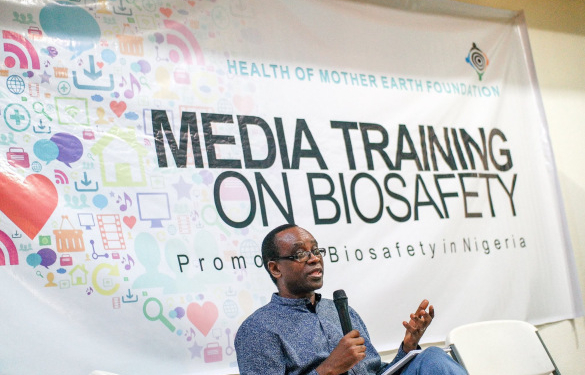Nnimmo Bassey, top environmentalist and Director, Health of Mother Earth Foundation, HOMEF has said there is need to boost agricultural production through small scale farmers as a way to discourage the influx of agricultural produce that are Genetically Modified.
Nnimmo made this known during a media training which was organized by HOMEF on Promoting Biosafety with focus on Genetically Modified Organisms, GMOs and their implications for Nigeria.
Nnimmo disclosed that 80% of the food in the world is produced by small scale farmers while large scale farming contributes just 20% of the food the world consumes. He debunked one of the justifications that GMO supporters have put up to encourage GMO plants and food in Nigeria.
He said, “One of the lies used in promoting GMO is ‘How can we feed the booming population of the world’ but there is enough food to feed double the world’s population, the problem is who have access to the food.”
Speaking on suggested regulations for GMOs, Nnimmo said “as it has been suggested that GMO foods should be labeled but the way we produce and consume our food doesn’t make it easy for labeling. It’s not possible to label akara, eko, eba, boli etc.
“We need to consider what is applicable in our socio-economic system when making regulations. If we can’t make the choice, it means, we’re not ready for GMO”, he added.
He shared some implications of GMO and said, “Synthetic products replace natural products; Release of organisms developed through synthetic biologic impact lands and territories and farmers will definitely lose out.”
The top environmentalist recommended that, there is need to revatilize public sector agriculture research and encourage small scale farmers by providing adequate infrastructure which will create easy access from farm to market.
Akinbode Oluwafemi, Deputy Director of Environmental Rights Action/Friends of the Earth Nigeria (ERA/FoEN) said Nigeria is not ready for GMO and doesn’t need GMO. He added that, “we do not have the policy environment, the regulatory environment and the socio-economic environment for GMO in Nigeria, so we do not need GMO in Nigeria.”
For his part, Barr Ifeanyi Nwankwere, a legal practitioner said “we cannot separate fundamental human rights from Biosafety because there is need to preserve our right to life and right to access information, so we need to know the contents of what we are consuming.”
He highlighted gaps in the National Biosafety Management Agency Act including poor access to information and the conflict of interest in the conposition of the board of agency which is composed of NABDA, set up to promote GMOs in Nigeria.

